Home Cyber Layman Internet ,,,,,Small and white, the QNAP TS-351 looks a bit like the snowman Olaf in the Frozen movie: don't want to, but in the rather austere environment of office NAS, the TS-351 is a bit of an unusual model. albeit with several surprises inside.
We have been testing it for a few weeks in different situations and with different disk configurations, and we can either give you a small account of its peculiarities even if those who are in the sector and know a little QNAP can largely imagine them already.
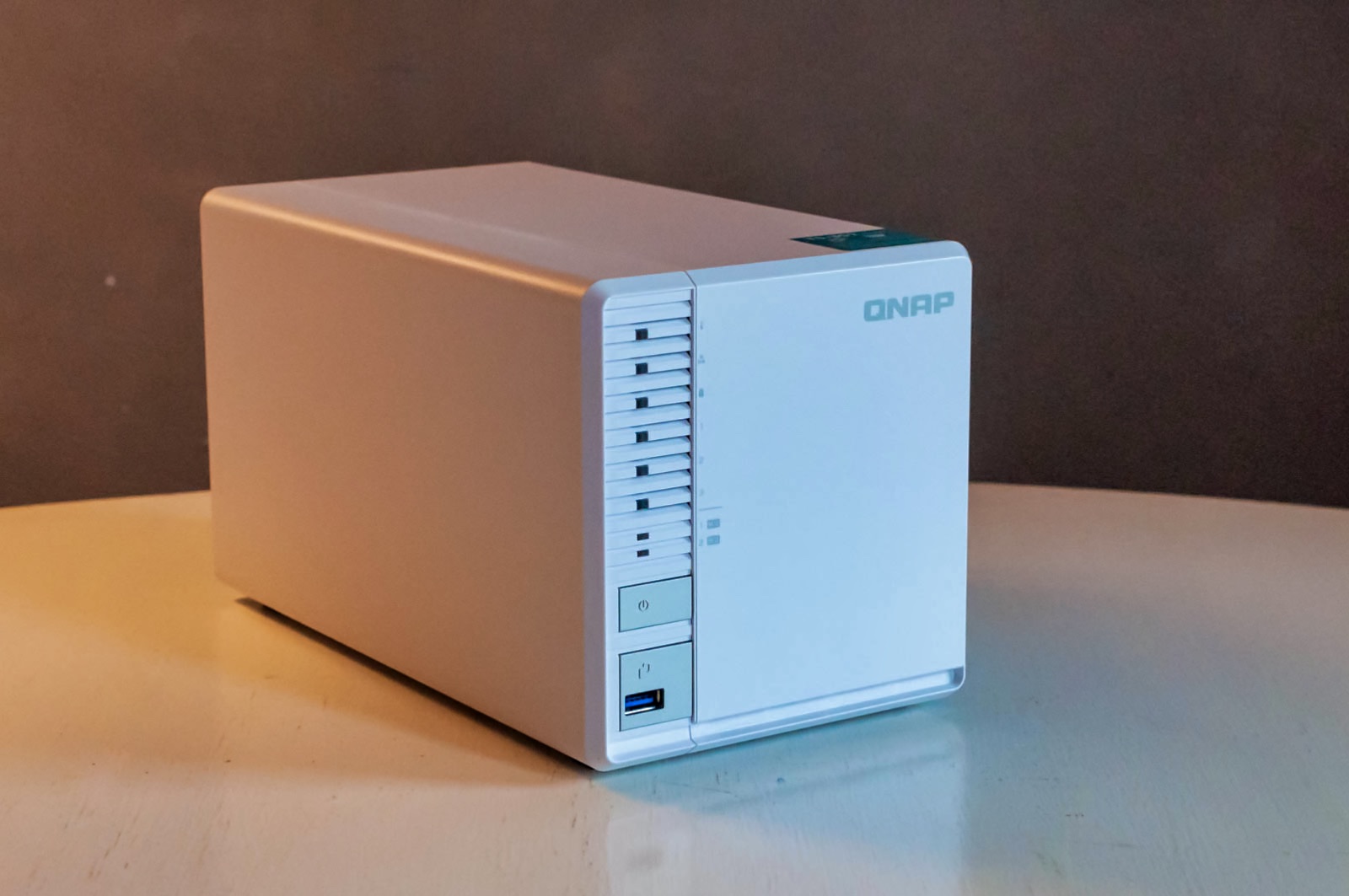
QNAP TS – 351 , the review
Cold change
The first peculiarity is given by the change of cold disks, in the sense that there are no drawer slots and to change a disk it is necessary to remove the plastic case, protected by three rear screws that open with a 10 cent coin.
Once the armor is opened, we immediately discover one of the most important peculiarities, which already teased us during the interview with QNAP: the slots for the mechanical discs are three (unlike the common thought that sees even-numbered housing in NAS) plus two slots for M.2 solid-state drives (PCIe Gen2).
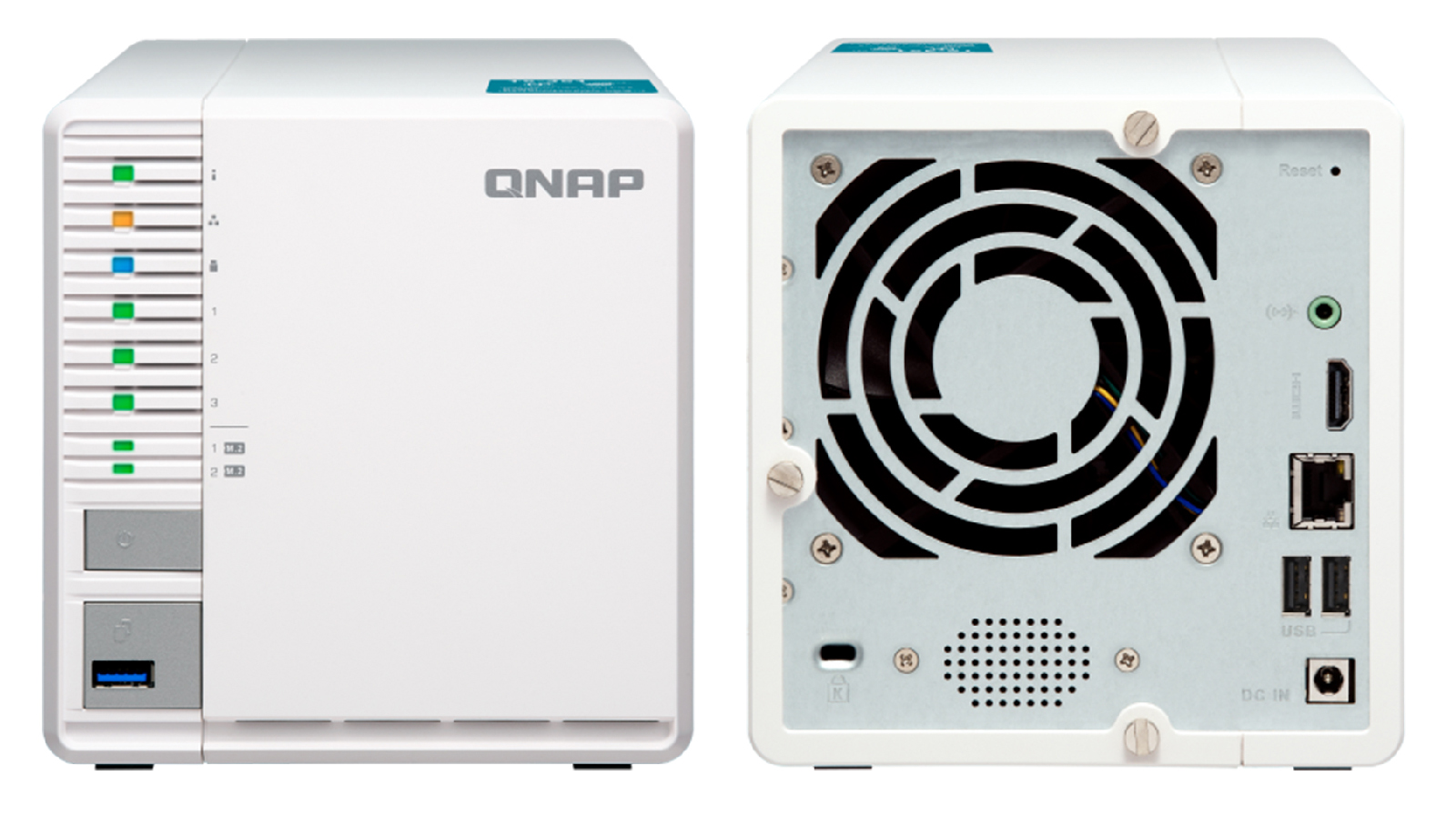
The NAS is seasoned with a front USB-A 3.0 port plus two others at the rear, an HDMI connector, analog audio jack and a single RJ-45 Ethernet connector: expandability solutions that, as we will see, offer different ideas, not only for data passage but that we would have seen accompanied by (at least) a USB-C and a second RJ-45 connector to create a virtual switch.
The sleds are populated with disks thanks to spring sockets, excellent for those who do not have dexterity with screws (more and more manufacturers are opting for this solution) but which make it impossible to mount 2.5 “SSD disks (less than do not use auxiliary skids sold by QNAP).
The M.2 slots, as well as the ram, are mounted inside and during the assembly of the disks they are easily accessible: in this regard we cannot fail to note that the basic equipment starts from 2GB of RAM than for a machine like this they are narrow, so we recommend those interested in a RAM upgrade with at least 4GB, optimal for multimedia situations and also for virtualization.
1 of 6 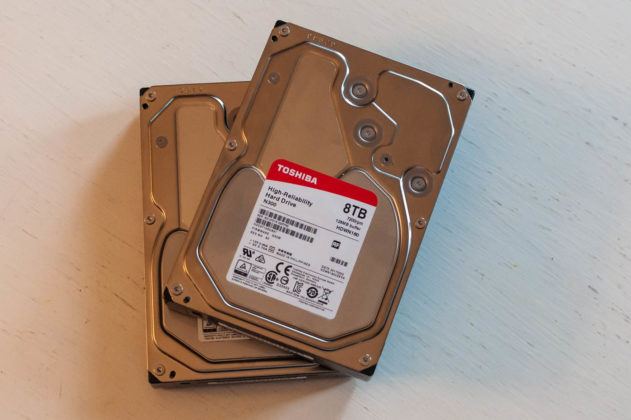 The Toshiba disks used for the test
The Toshiba disks used for the test 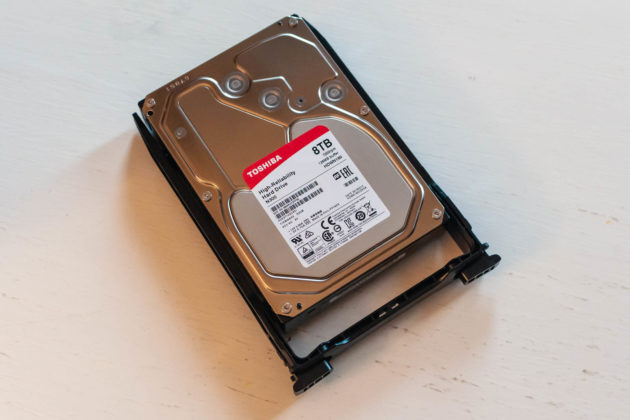 The sled, which mounts without screws
The sled, which mounts without screws 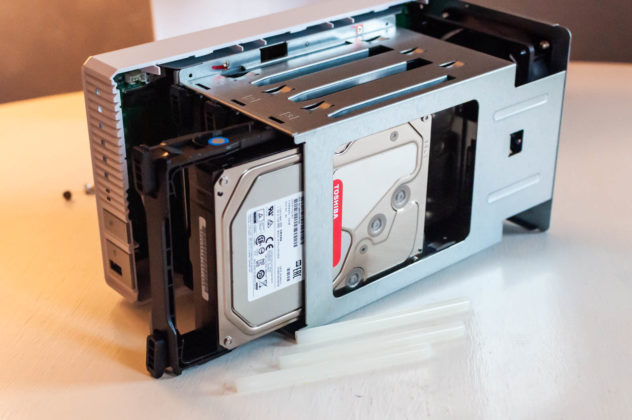 No hot installation: to change the disks you need to disassemble the NAS
No hot installation: to change the disks you need to disassemble the NAS 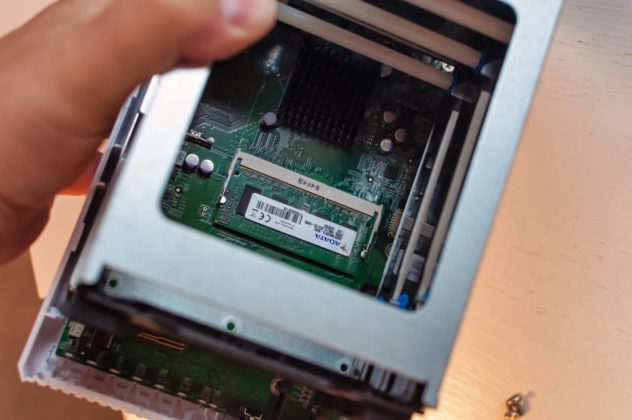 The RAM, here hidden inside the disk compartment mechanical
The RAM, here hidden inside the disk compartment mechanical 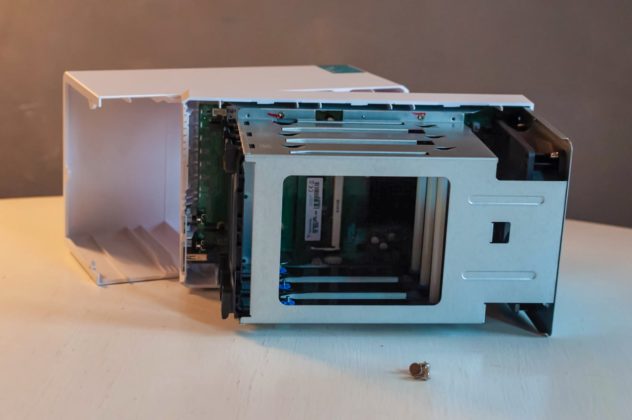
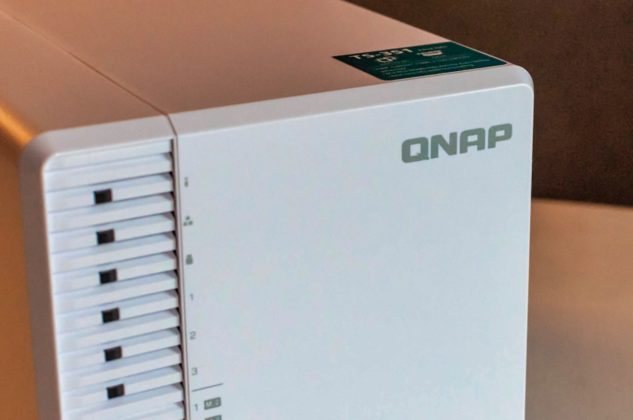
Departure
The installation was flawless as always, thanks above all to the maturity of QTS 4.3.5, the operating system that lends itself well to any type of approach: we started from Mac thanks to Qfinder which has identified the server in the network and has given the go-ahead for the first access, to then follow the instructions via the web for all the steps and in about ten minutes we had completed the preliminary operations.
If you want, however, everything can also be done from smartphones and iOS and Android tablets thanks to the QNAP Apps, although we believe that the convenience of a Desktop environment in this sense is still unmatched.
1 of 3 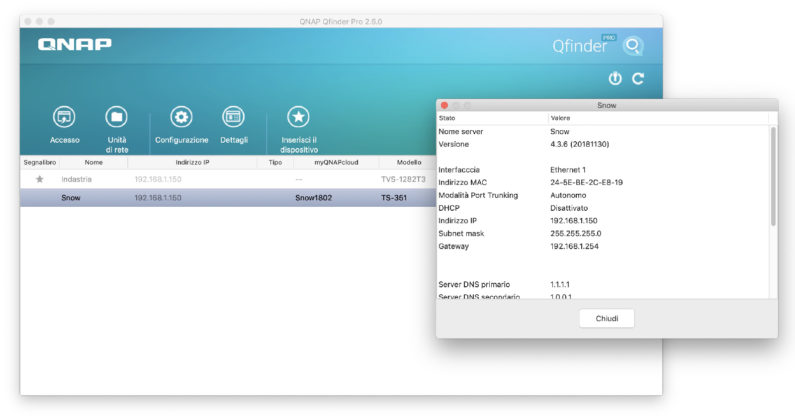 Qfinder, the App for Mac that allows its identification on the network before installation
Qfinder, the App for Mac that allows its identification on the network before installation 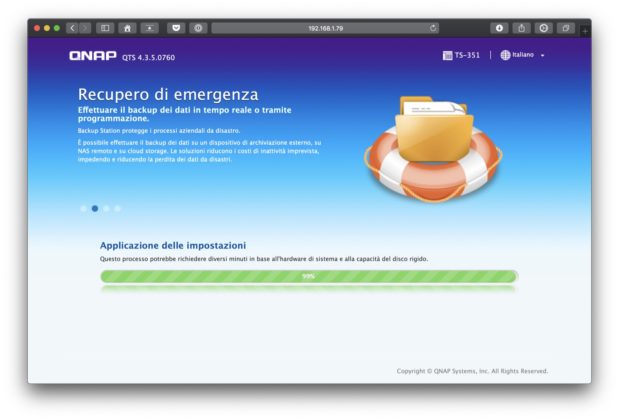 The installation phase
The installation phase 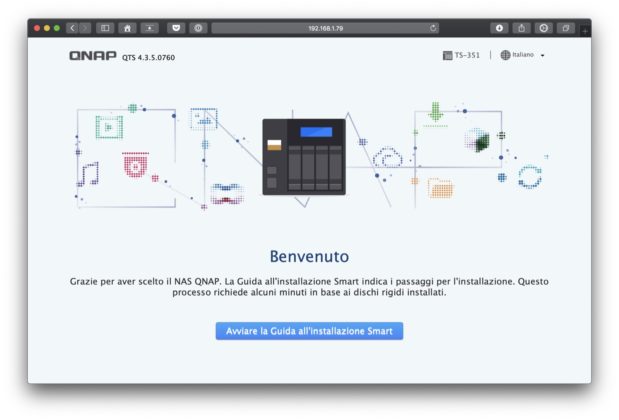 The welcome screen
The welcome screen
As for the disks we have performed various tests, starting from the installation with single disks to that in RAID: using two Toshiba N300 8TB disks it is possible to produce two distinct volumes in 8TB JBOD or by modulating the RAID obtain a volume of 16TB (Raid 0), or one of 8TB with redundancy (Raid 1): but following the characteristics of the product we opted for a Raid 5 set by adding a third disk, obtaining a space of just over 10 TB (the third disk was 6TB ) with redundancy.
The disks proved to be optimal for the machine with good internal temperature containment: the TS-351 does not seem to be designed for quiet operation, because the fan tends to start a little too often, which is completely irrelevant in an office. consequently that “scratch” here and there of Toshiba discs that you hear when you pay attention has not been so heard.
We were a little surprised by the preparation of Set Raid 5 which took more than a day to perform the pairing: we expected a little less, even if it must be said that the disc offered full operation after a very short time, the tight time to create the space for downloading the apps necessary and we were able to leave for the exploration (so to speak, we knew QTS well, we saw it this summer with the QNAP TS-453B and with the QNAP TVS-1282T3 ) of the peculiarities and potential of the solution offered by the TS-351.
1 of 3 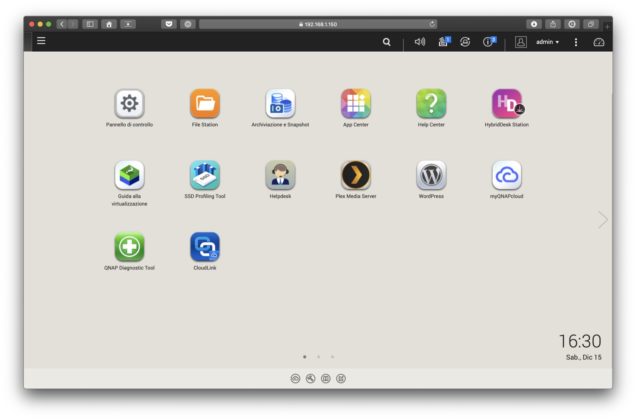 The QTS home, clean and essential
The QTS home, clean and essential 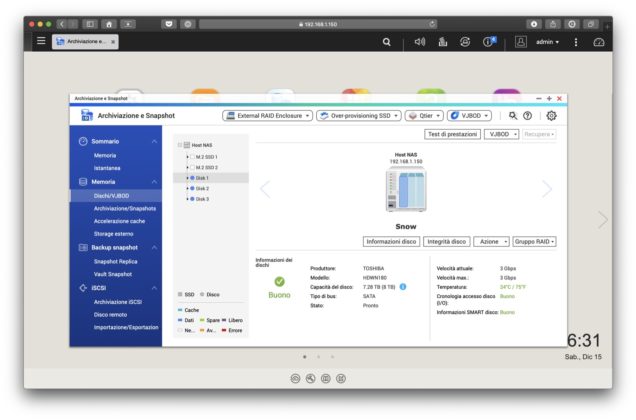 disk management
disk management 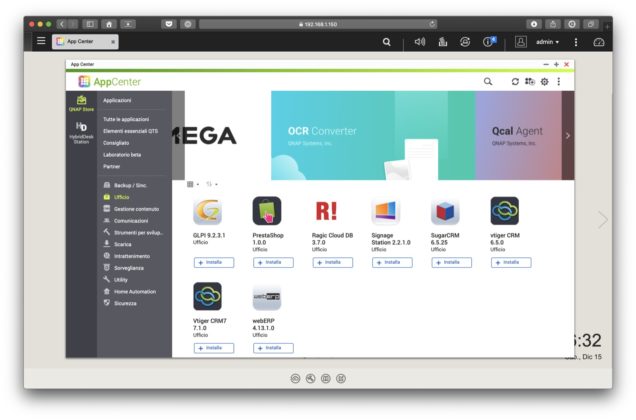 The QTS App store, very well stocked
The QTS App store, very well stocked
QTS 4
QTS has shown the usual cleanliness and potential both in the office environment and from the multimedia point of view with ready and very versatile Apps that here and there have put our favorite Plex solution in difficulty.
The system proved to be very flexible even if in the choice and initial configuration of this TS-351 we had to dwell a little longer than expected, especially to explore the particularities of functions such as snapshots and the management of redundancy in disks.
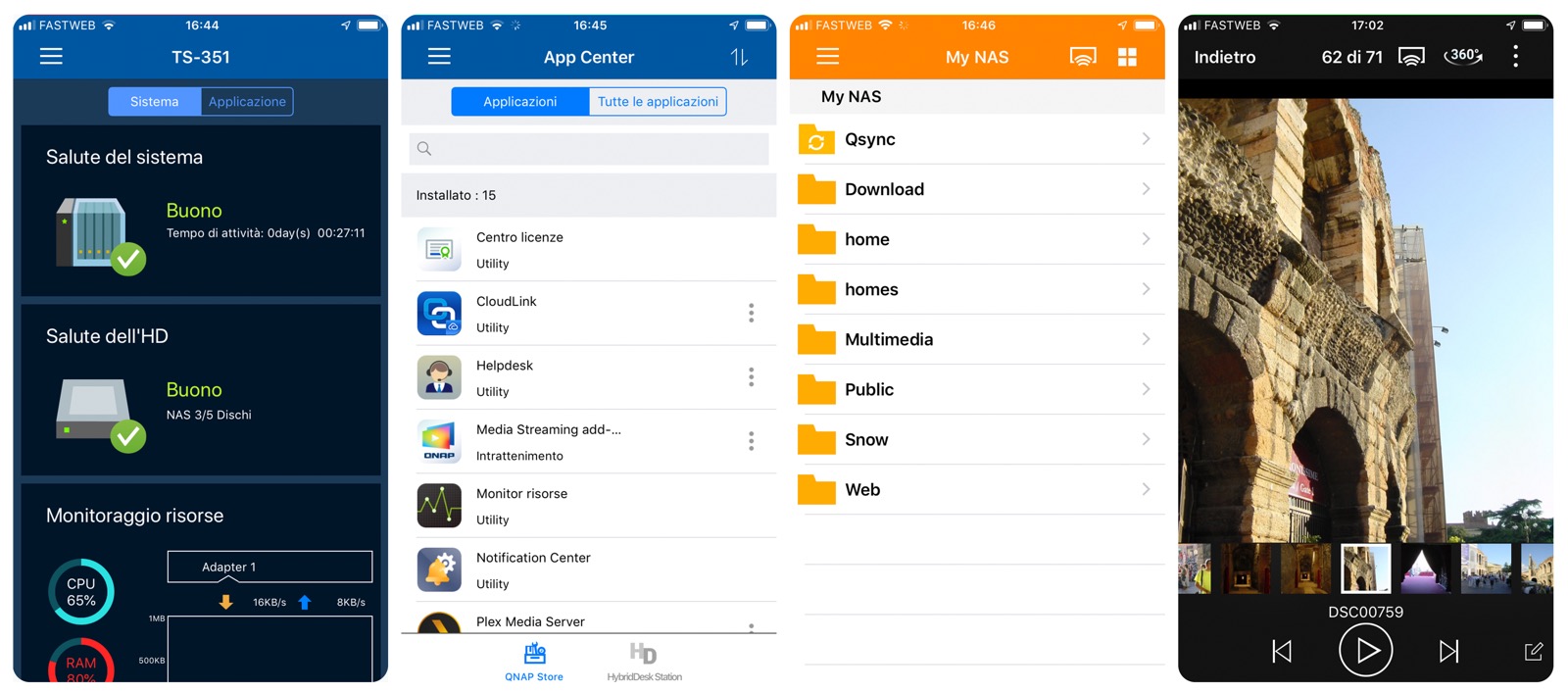 The Qmanager, Qfile and Qphoto Apps, here on iPhone 8
The Qmanager, Qfile and Qphoto Apps, here on iPhone 8
We really liked the proposed virtualization solution, which in five clicks is able to generate a virtual image of an operating system of your choice (Windows or Linux), a factor that can be fundamental in some work solutions and that can also be the first. reason for purchase.
We also loved the Photo Station App's choice of opting for an active database on the archive, rather than like other competitors for a photo-by-photo build server, which makes everything much easier.
The number of active apps and services is very high, ranging from the use of Office to solutions to develop, from WordPress to various software for data or email backup, up to a (perhaps too) complex warning system towards the 'user, something that some will certainly appreciate but that many will instead look at with more than some perplexity.
1 of 3  The File Manager
The File Manager 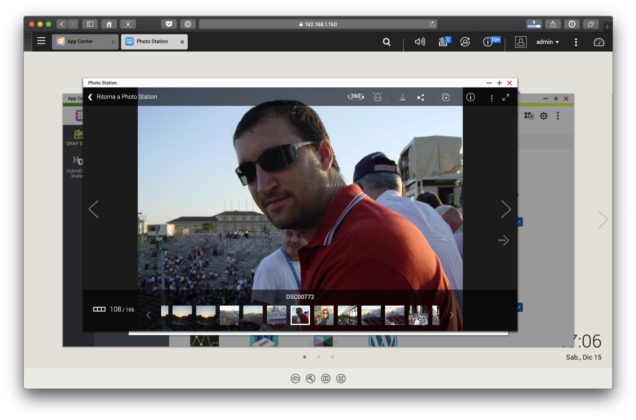 The Qphoto App
The Qphoto App 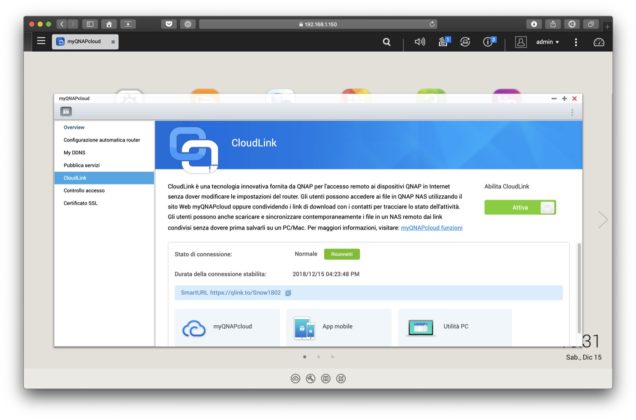 Cloudlink, to find the NAS also from external network
Cloudlink, to find the NAS also from external network
Considerations
Like the brothers we talked about a few months ago, the QNAP TS-351 is also a good solution for office storage, with a high number of services and a great flexibility of configuration, despite the odd number of disks at the indoor.
It goes without saying that much of the positive judgment is based on QTS, which excellently holds up the underlying hardware masterfully governing it and at the same time offering a plethora of Apps and software ideal for both the home user and the advanced office user. .
We have not talked much about the storage part alone, because now it is a basic quality on which QNAP does not compromise but which has become ground anyway even for the most famous brands: the difference is the services and the elasticity of configuration that here with a RAID 5 at affordable prices and two SSDs for caching seems very fertile ground.
Pro : • Enables RAID 5 at low prices • Small and compact • QTS is excellent
Against: • The basic RAM configuration is not sufficient • Fan a little noisy
Price: 400.00 Euro (for the version without discs)
Users can find TS-351 (here the link to the product sheet) in the chains authorized by QNAP, or directly online.
During this review we used Toshiba N300 8TB NAS disks: you can buy them in 4TB, 6TB or 8TB versions.
,,





